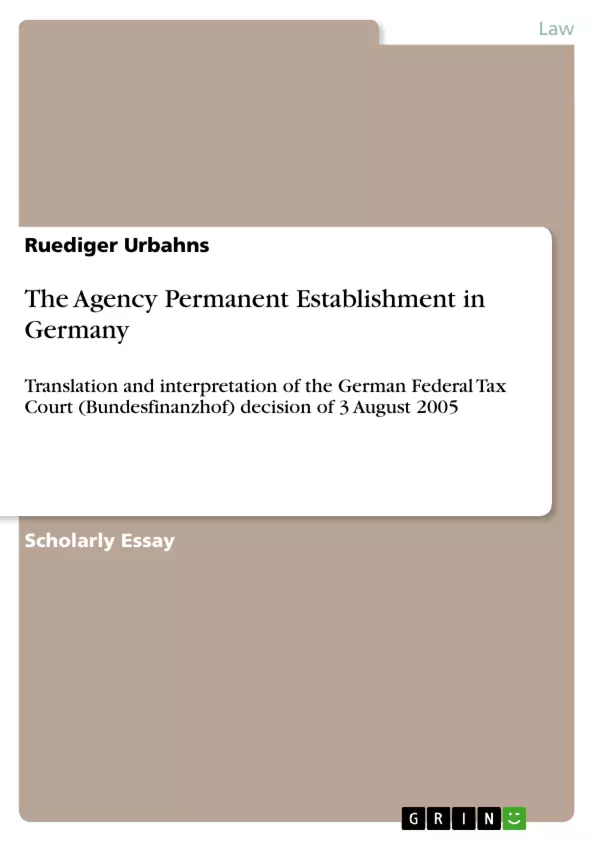The intention of this script is to provide the international tax expert community respectively (tax) managers dealing with international PE cases with a first familiarization of the German agency PE concept. For this purpose the Bundesfinanzhof decision of 3 August 2005 – regarding a disputed agency PE under the Germany/Portugal double tax convention in the construction industry - shall serve as an example and is thus translated and shortly commented in this sense.
Inhaltsverzeichnis (Table of Contents)
- PREFACE
- I. EINFÜHRUNG
- I. INTRODUCTION
- II. LEITSÄTZE
- II. SUMMARY OF JUDGEMENT
- III. TATBESTAND
- III. FACTS AND CIRCUMSTANCES
- IV. ENTSCHEIDUNGSGRÜNDE
- IV. OPINION AND REASONING
- V. ABSCHLIEBENDER KOMMENTAR
- V. FINAL COMMENTS
Zielsetzung und Themenschwerpunkte (Objectives and Key Themes)
This document aims to provide a clear understanding of the agency permanent establishment (agency PE) concept within German tax law, as interpreted by the German Federal Tax Court (Bundesfinanzhof) in their decision of August 3, 2005. The analysis focuses on the meaning of the term "habitually exercise" in the context of establishing an agency PE according to tax treaty rules, specifically the Germany/Portugal double tax convention.
- The concept of agency permanent establishment (agency PE) in German tax law
- The interpretation of the term "habitually exercise" within the context of agency PE
- The significance of the Federal Tax Court's decision in the Germany/Portugal double tax convention case
- The potential impact of the agency PE concept on international trade and business relations
- The distinction between agency PE and other forms of permanent establishments
Zusammenfassung der Kapitel (Chapter Summaries)
The preface provides an overview of the document's purpose and explains the significance of understanding agency PE in international tax contexts. It highlights the complexities of navigating cross-border tax cases and the challenges of finding reliable and relevant tax information.
The "Introduction" section introduces the concept of agency PE as a special sub-form of permanent establishment. It outlines the rationale for establishing this category and discusses the potential for foreign companies to circumvent general PE rules through the use of domestic agents. The section also emphasizes the importance of defining and interpreting the term "permanent agent" correctly to prevent undue restrictions on international business.
The "Summary of Judgement" section outlines the key findings and conclusions reached by the German Federal Tax Court in their August 3, 2005 decision regarding a disputed agency PE in the construction industry under the Germany/Portugal double tax convention. This section highlights the specific legal and factual details of the case and provides a concise summary of the court's reasoning.
The "Facts and Circumstances" section details the specific context of the case, outlining the activities of the foreign company and its representative in Portugal and Germany, respectively. This section provides a detailed account of the facts relevant to the court's decision and establishes the basis for understanding the court's reasoning.
The "Opinion and Reasoning" section analyzes the Federal Tax Court's legal arguments and rationale for its decision. It explores the court's interpretation of the term "habitually exercise" in the context of establishing an agency PE and the specific criteria used to determine whether the necessary element of permanency exists. This section provides a comprehensive understanding of the court's decision-making process and the legal framework surrounding the agency PE concept.
Schlüsselwörter (Keywords)
The key terms and concepts explored in this document include: Agency permanent establishment (agency PE), tax treaty rules, double tax convention, "habitually exercise," permanent establishment, international business, foreign enterprise, domestic agent, legal interpretation, German Federal Tax Court (Bundesfinanzhof), tax law, cross-border taxation.
Frequently Asked Questions
What is an "Agency Permanent Establishment" (Agency PE) in Germany?
An Agency PE is a form of tax presence where a foreign company is deemed to have a taxable base in Germany because of the activities of a domestic agent acting on its behalf.
What does "habitually exercise" mean in tax law?
It refers to an agent regularly and repeatedly concluding contracts or negotiating on behalf of a foreign enterprise, which can trigger tax liability in the agent's country.
Why is the Bundesfinanzhof decision of 2005 significant?
The decision clarified the criteria for an Agency PE under the Germany/Portugal double tax convention, specifically in the construction industry context.
How can foreign companies avoid unintentional Agency PEs?
By ensuring that domestic agents do not have the authority to conclude contracts or habitually exercise such authority without the company's direct involvement.
Does an independent agent trigger an Agency PE?
Generally, no. Independent agents acting in the ordinary course of their business do not typically create a permanent establishment for the foreign company.
- Citar trabajo
- Dipl. Finanzwirt (FH), MITax, Steuerberater Ruediger Urbahns (Autor), 2009, The Agency Permanent Establishment in Germany, Múnich, GRIN Verlag, https://www.grin.com/document/120927



